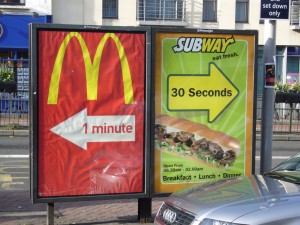It’s almost impossible for parents to shield their children from junk and fast food marketing.
About a quarter of ACT children and more than 60 per cent of ACT adults are overweight or obese, increasing their risk of developing chronic diseases. Major reviews of the evidence on the effects of food advertising to children have all concluded that food advertising influences children’s food preferences, purchase requests, consumption and overall diet.
I watched the community’s engagement with the advertising to children audit with interest, and was pleased to see overwhelming support for change. It’s not surprising that there is strong support for curbing junk food advertising to children, with the audit also revealing the short and long-term health consequences of childhood overweight and obesity.
However, two argument threads raised concern. The first was that parents are solely responsible for their children’s health, with advertisers absolved from any responsibility, and the second argument (from the Australian Food and Grocery Council) that restricting junk food advertising won’t make any difference to the levels of overweight and obesity.
Like other parents, I am playing my part to raise a healthy family but I am undermined by an environment that makes healthy choices difficult. I disagree that it is easy for parents to stop their children eating junk food. I say “no” to my children. I’m good at it. I resent being put in the position where I have to say no as often as I do. Parents are struggling against millions of advertising dollars targeted at our children and designed to change their behaviour.
I will recount a small part of a conversation I had with my children on a recent outing to the local pool.
“Mum can we have a slushy?” “No.”
“Mum please can we please have a slushy?” “No.” “I’ll pay for it with my pocket money. Other people have slushies. Why do you always say no? Can we have a swim first and then have a slushy? Could we share a slushy? If I eat my apple can I have a slushy? You are so unfair.” And wait for it.
“I wish you weren’t my Mum.” Ouch.
I started to explain that we’d brought our own food and we hadn’t planned to buy any treats.
I needn’t have bothered because their next question was, “Can we have hot chips? Mum please, please, please.”
I am a marketer with more than 20 years’ experience. I know that marketing and advertising works. I don’t accept that reducing the amount of junk food advertising will make no difference. If advertising doesn’t work, why do junk food and drink companies use it?
Marketing is about using a disciplined approach to determine the best price, place and promotion strategies to sell more product. Every effort is undertaken to understand consumer market segments and behaviour. Large companies don’t operate on the basis of gut-feel or opinion. They operate on the basis of hard evidence and proven experience and no advertising dollar spent is unaccounted for.
Extensive testing is undertaken to ensure their message is absorbed.
Have you noticed how many junk food advertisements line the shopper pathway into the supermarket? Or the placement of sugary drinks and confectionary while you’re a captive audience in the checkout queue? This is strategic placement designed to attract the attention of children.
Children are a unique, vulnerable segment of our community that need our protection because they do not have the ability to take care of their own health or understand marketing’s purpose and intent. How should we address the imbalance of unhealthy advertising targeted at our children? How can we stop shifting the blame for childrens’ health to parents? There will be no solution without a co-ordinated effort by government, the food and beverage industry, the community and individuals.
The ACT government has indicated it will conduct a community consultation process on the issue of advertising to children in the next couple of months. I urge parents to contribute, raise their concerns and propose solutions. We are responsible for our children and we can use our voice to argue for a healthy environment that supports rather than undermines our efforts.
Jennifer Ramsay is the Campaign Manager for LiveLighter ACT, a healthy weight promotion campaign targeted at adults to encourage them to eat better and be more active. She has three daughters and does her best to ensure they eat “sometimes” foods, sometimes.




